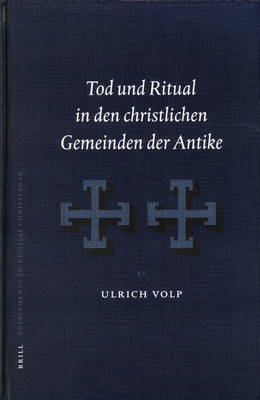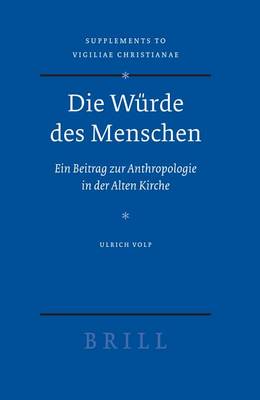Vigiliae Christianae, Supplements
2 primary works • 3 total works
Book 65
The development of Early Christian rituals in connection with death and burial has so far not sufficiently been explored. Volp's study focuses on the surviving literary sources-both pagan and Christian-, together with inscriptions and other archaeological remains while taking into account recent results from science and humanities. A summary of death and ritual in the ancient Mediterranean religions is followed by detailed analyses of the Christian sources from the 2nd to the 5th century. Thus, basic developments are being discovered which led to and accompanied the forming of Christian rituals, such as ritual purity or the social structure of family and society. Being the first such interdisciplinary approach, it also represents the first monographic work on the topic since 1941.
Book 81
There can be no doubt that there is a link between early Christian statements on human dignity and the corresponding modern concept, as it appears ever more frequently in current bioethical debates. This study attempts to throw light on the surprisingly complex process of the emergence of such a Christian concept of human dignity in antiquity and portrays it as a process governed by contradictions and antagonisms: between biblical and platonic anthropology; between a platonic and a stoic perception of humanity; between gnostic and antignostic cosmology; between biblically based criticism of human culture on the one hand and heilsgeschichtlichem cultural optimism on the other hand; between Greek and Roman thinking. This history of the idea of the "dignity of man" is being recounted taking into consideration the complex matrix of Christian theory and practice (including issues such as worship, contraception and abortion), piety and theological reflection, ethics, liturgy and theological as well as cutural anthropology.
***
Bei dieser Studie handelt es sich um den Versuch einer zusammenfassenden Darstellung der christlich-antiken Auseinandersetzung mit der Wurde des menschlichen Lebens Diese wird nicht nur gegenwartig etwa in der Bioethik wieder kontrovers diskutiert, sondern ist auch in der Antike ein Feld philosophischer und theologischer UEberlegungen gewesen. Volp fragt, inwieweit sich in den Schriften der antiken christlichen Denker die Vorstellung einer mit einer besonderen Wurde ausgestatteten gemein-menschlichen Natur findet, die Menschen von Tieren und von belebter und unbelebter Materie unterscheidet, und wie diese Natur gefasst und begrundet wird. Ausgehend von der These, dass diese UEberlegungen nicht nur Auswirkungen auf die ethische und religioese Praxis der Alten Kirche hatten, sondern umgekehrt auch entscheidend von ihr gepragt wurden, konzentriert sich die Arbeit nicht nur auf die theoretischen AEusserungen der Kirchenvater, sondern bezieht ethische Konkretionen (Schwangerschaftsabbruch, Umgang mit Menschen mit Behinderungen, Krieg) und den christlichen Kult mit in die Untersuchung ein. Zum Vorschein kommt ein uberraschend komplexes Bild einer alles andere als selbstverstandlichen geistesgeschichtlichen Entwicklung, deren Folgen bis in die heutige Zeit nachwirken.
***
Bei dieser Studie handelt es sich um den Versuch einer zusammenfassenden Darstellung der christlich-antiken Auseinandersetzung mit der Wurde des menschlichen Lebens Diese wird nicht nur gegenwartig etwa in der Bioethik wieder kontrovers diskutiert, sondern ist auch in der Antike ein Feld philosophischer und theologischer UEberlegungen gewesen. Volp fragt, inwieweit sich in den Schriften der antiken christlichen Denker die Vorstellung einer mit einer besonderen Wurde ausgestatteten gemein-menschlichen Natur findet, die Menschen von Tieren und von belebter und unbelebter Materie unterscheidet, und wie diese Natur gefasst und begrundet wird. Ausgehend von der These, dass diese UEberlegungen nicht nur Auswirkungen auf die ethische und religioese Praxis der Alten Kirche hatten, sondern umgekehrt auch entscheidend von ihr gepragt wurden, konzentriert sich die Arbeit nicht nur auf die theoretischen AEusserungen der Kirchenvater, sondern bezieht ethische Konkretionen (Schwangerschaftsabbruch, Umgang mit Menschen mit Behinderungen, Krieg) und den christlichen Kult mit in die Untersuchung ein. Zum Vorschein kommt ein uberraschend komplexes Bild einer alles andere als selbstverstandlichen geistesgeschichtlichen Entwicklung, deren Folgen bis in die heutige Zeit nachwirken.


